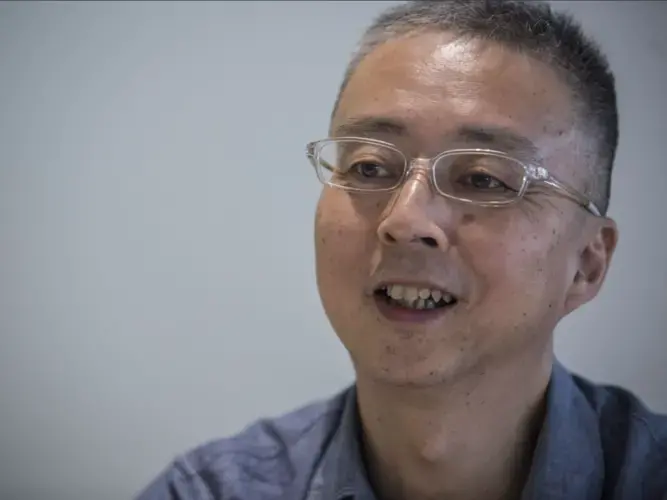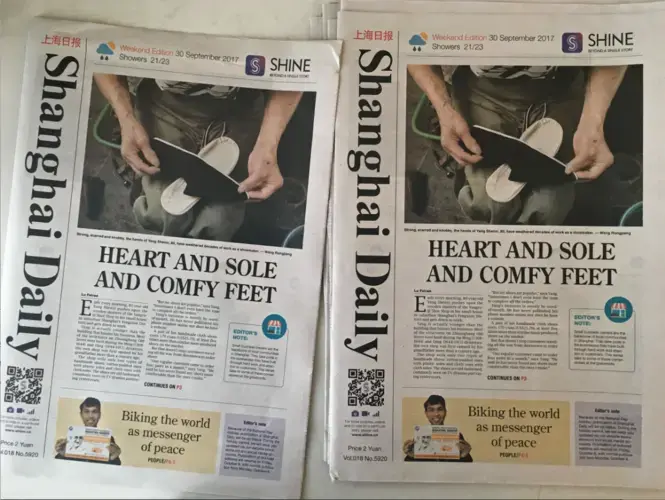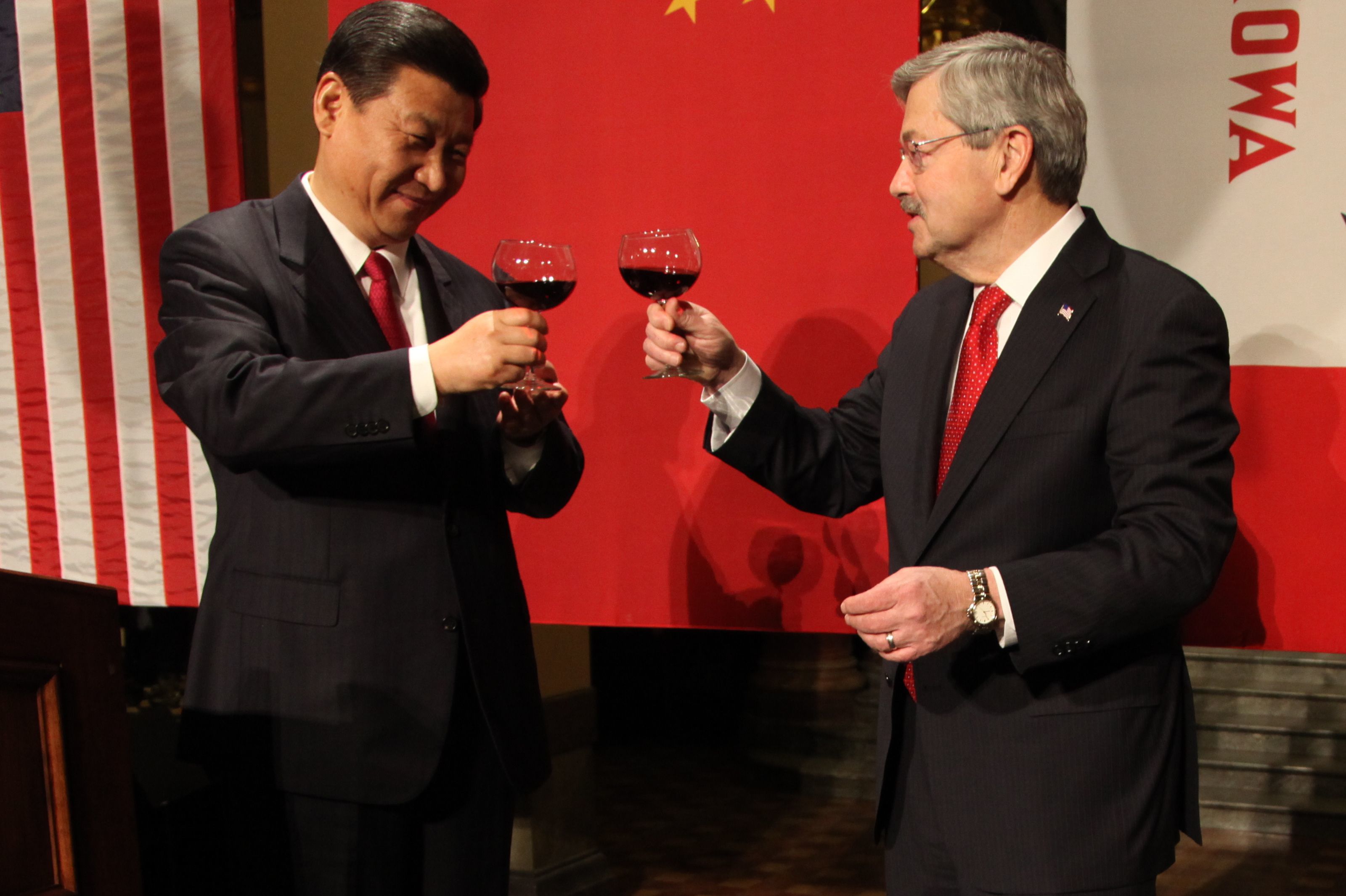
SHANGHAI, China — I stepped into a newsroom on the opposite side of the globe and instantly felt right at home.
Not because the panorama of China’s largest city was spread out in front of me from the 40th floor of a high rise that’s home to the Shanghai Daily.
My desk in downtown Des Moines may command a view of the shiny gold dome of the Iowa Capitol, but my perch on the fifth floor isn’t planted among the massive concrete and steel of an international commercial port with more than 24 million people.
The familiarity came courtesy of the journalist workstations, which must look about the same everywhere: Books and papers piled around computer monitors, a conference table to stage the drama of the daily news meeting, and the general office debris of deadline pressure.
But I soon found out that U.S. and China journalists share much more, including a common desire to promote positive change through unbiased reporting.
My colleague Kelsey Kremer and I were there to meet Wang Yong, the newspaper’s opinion editor.
INTERACTIVE MAP: See the many places Iowa culture influences Chinese culture
WATCH: Follow our journey through China on our new Facebook Watch page
Our two-week reporting trip to China included core missions such as time with Ambassador Terry Branstad at the U.S. Embassy in Beijing or a visit to the farmland of our sister state of Hebei Province.
But this was more of a serendipitous meeting made possible by a native Iowan and former state representative, Greg Cusack, who now lives in Portland, Oregon.
In recent years he had struck up regular correspondence with Yong based on his work and wanted to connect us as kindred spirits.
That dovetailed perfectly with one of my goals for the trip: Sit down with a Chinese journalist to compare notes on reporting in our respective countries.
I was intrigued by Yong’s very job title: What “opinion” can a journalist express when working for state media in a communist country?

In the weeks since we sat down with Yong, President Donald Trump’s visit to China triggered a fresh round of debate on the role of a free press in international diplomacy.
Trump deferred to Chinese President Xi’s wishes to avoid reporters’ questions during their joint appearance in Beijing and was roundly thrashed for it.
When Xi visited Iowa five years ago, I was able to stand mere feet from him as he spoke with Iowans. But I never got to ask a question.
So is this where our two cultures hit a logjam? Stuck between the ideals of individual freedom that questions authority and collective party rule that is interested in preserving decorum?
Yong, 51, was the perfect guy for this discussion.
He was savvy, thoughtful and gracious. And he has spent time in America and studied our constitutional law and media history.
In China in recent decades Yong has seen, he said, “a sea change in the degree of how people can express themselves.”
Here in America, we hear a lot about the “Great Firewall” that still separates and censors much of digital life in China from the rest of the world.
MORE: Iowa in the Heart of China: The series so far
But Yong said that online news forums are more open to debate, and sometimes “maybe you have a surreal feeling that you are in America reading New York Times.”
“We do enjoy greater and greater space of this kind of expressing yourself,” he said.
It’s true that to immerse yourself in modern life in a Chinese city is to forget the backdrop of government, much as we do in America.
For instance, I attended a concert at a Shanghai rock club, MAO Live House, that celebrated its eighth anniversary with a diverse lineup that was a blend of Western influence: A pop group fronted by a woman in a cat mask, a gangster rapper, a bracing punk quartet called Dirty Fingers, and even a reggae singer.
The crowd might have been rowdier at the U.S. version of the same concert, but all the familiar social cues of rock ’n’ roll were on display.
Similarly, with Yong I felt like I was speaking a common language of journalism.

The Shanghai Daily, launched in 1999 for an English audience, has a print circulation of about 100,000, distributed primarily in hotels, universities and expat communities.
But Yong has been living through the same digital shift that has been both a creative boon and business hurdle for U.S. journalism.
He circulates his stories on Weibo, China’s version of Twitter. This fall the Shanghai Daily launched a new app, “Shine,” to promote more of a mobile-first delivery of its news.
The app menu has a category devoted to viral stories, such as “Burglars filmed cleaning home after robbery,” “Mother gives birth on high-speed rail platform” and “Two-wheeled dog crawls into people’s hearts.”
Have I emphasized yet in this “Iowa in the Heart of China” series that people basically are the same everywhere?
Yong oversees a pair of writers whom he assigns to a variety of topics.
"If we want to write good opinions, we do not have our ideas just from the top of our head," he said. "We need to go to daily life, we talk to different people. So I really like this kind of face-to-face communication experience. It is very important, especially in the age of the Internet."
For instance, after sensing widespread grumbling about stricter security screenings at local railway stations, he deployed a reporter to observe the checkpoints in practice and talk to officials and citizens alike.
“Our principle is, OK, we can be critical," Yong said, "but we do not criticize only for the sake of criticizing. We want to have a solution.”
Yong embraces what some media theorists have called "constructive journalism."
Cynics in the West would call that a convenient way for an authoritarian regime to allow just enough criticism to ease social pressure while staying in power.
But then cynics in China might point to the current brawl that is the media biz in the U.S. A deepening partisan war rages within our own industry even as its collective relationship with the White House is more adversarial than ever.
Yong and his colleagues in China would not have to analyze too long to conclude that maybe the West hasn't figured out everything, either, when it comes to a thriving free press.
As a Western journalist, I embrace the idea that democracy is a glorious raucous mess. And in the post-Watergate era it has been journalists' job to try to sort through that mess with objective reporting and clear, well-reasoned opinion.
We know we'll fall short more than we like. But if we follow a rigorous, transparent process of reporting, we’ll get as close as possible while also giving our readers the tools to fill in the cracks.
Yong is a fan of many Western media sources, including National Public Radio, or the BBC. But he notices every time a report mentions, say, "communist China" rather than just "China."

He's right that opinion and bias — whether on behalf of one person's viewpoint or that of an entire hemisphere — can creep in with a single adjective.
He also sees Western media getting overly zealous with conflict. We string together he-said, she-said quotes that remove us from the role of direct advocate, but in the construction of the story we end up pushing a point of view.
“I always try to be objective and somehow nice to a foreign culture," Yong said. "And if I want to criticize, then I criticize myself.”
Ultimately, we can't remove journalists from the context of their cultures. Asian societies often are based on a concept of harmony, Yong said.
Not that they have a monopoly on wisdom, he added. The drive for modernization has obscured some of that ancient wisdom in favor of science — but in science Yong also sees a metaphor for a curious, humble and diligent journalist.
“The real scientific spirit is not to be sure of everything,” he said.
One of Yong's tools in his daily journalism has been an ancient musical instrument: In recent years he has learned to play the guqin (or just qin), a 3,000-year-old seven-stringed instrument that dates to the time of Confucius.
He often befriends and interviews some of his fellow players who come from all different walks of life.
“As a responsible opinion editor, I think we should promote the idea of open-mindedness, tolerance, and mutual understanding," Yong said. "Instead of pointing a finger at each other and dividing between us and them.”
It's not a magic formula, he added, but it might lead to fewer conflicts.
As a Western journalist less averse to conflict, I admired Yong for both his integrity and his aims.
On our last night in Shanghai, Kremer and I found ourselves inside another high rise, this time the restaurant Char on the 29th floor of Hotel Indigo, overlooking the Hangpu River.
The menu featured a thick and juicy cut of Omaha steak.
How different did it taste just because I was in China? Depending on the meal — or the story, if we're talking journalism — it can be difficult to tell.










